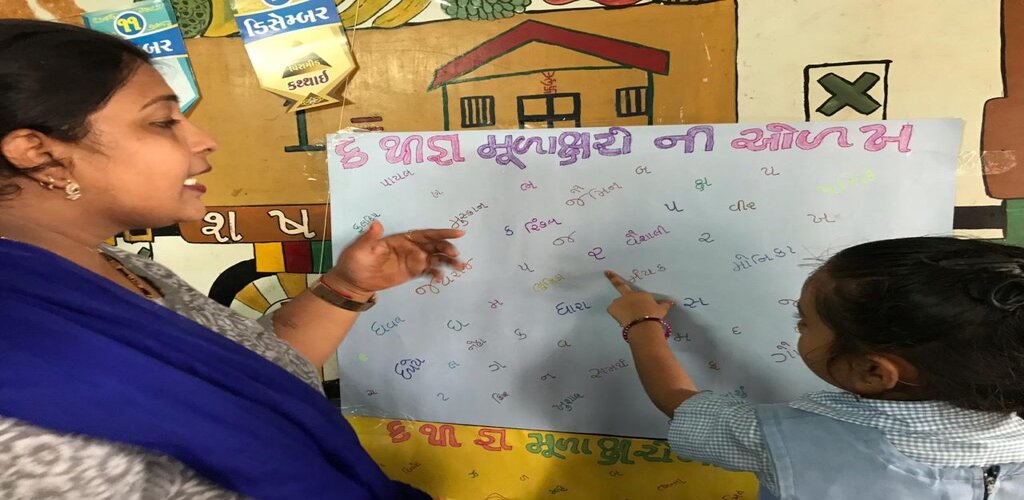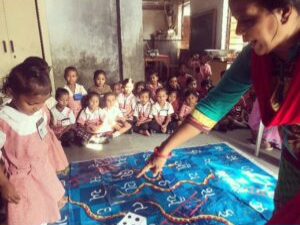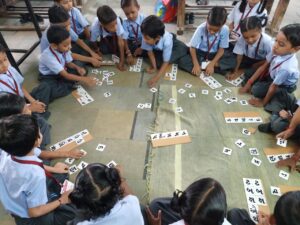About Neev
A Tale of Two Children
Two 4 year-old children are about to start their pre-school. Maya, a curious 4 year old in Alkapuri (Vadodara) will, fortunately, be able to attend a good school where competent teachers are motivated and adequate learning resources are available. Mayank, a boy of the same age who lives with his grandmother in a remote part of the Vadodara district in Gujarat, India will unfortunately not get the chance to go to a school that can promise an adequate standard of education.
Over the course of primary school, Maya will benefit from effective teaching practices. Her teachers will give examples to illustrate concepts, provide guided practice, and give her friendly and personalized feedback. She will have a wide array of books to choose from, feeding her creative mind and providing contextual knowledge to everything she learns. By the end of second grade, she will be reading and comprehending full sentences quickly and progressing to longer texts.
In contrast, Mayank will struggle to read single words, let alone sentences. His 1st grade teacher is not fluent in English, the medium of instruction. He cannot get extra help because there are more than 60 pupils in his class and there are no story books at school. Further, Mayank gets home from school tired because he walks two hours and fails to retain his learning and complete homework independently. His grandmother can’t read and write, and they speak the local dialect (colloquial Gujarati) at home. Little Mayank finds it hard to learn and lessons are sometimes confusing and out of his reach. While his teachers will be doing their best to help him, soon enough, Mayank will start to lose motivation and dislike going to school. By the end of primary school, Maya will begin to reach novels while Mayank will struggle to read a simple short story.
We want to change the narrative of Mayank’s journey. We want Mayank to be able to read and learn on par with his counterparts from better resourced backgrounds. Through our intervention, we want to ensure that Mayank receives a good education in his foundational years too which will prevent the growing learning gaps that he is ever so likely to face as he grows up and navigates elementary school.
To learn more about how we do this, click here.

Foundational Learning
Learning starts at birth. Gradually by listening to spoken language, the child develops an understanding of the world around her through. She goes on to learn to speak her native language. Over time, with the help of elementary schooling, she learns to read and write as well.
Elementary schooling lays the foundation which prepares a child for a never ending journey of learning. Education is believed to be the preparation for life and the key to social and economic empowerment. Foundational learning is, therefore, a crucial factor that determines the readiness and efficacy of all learning that follows and eventually the progress that child is able to make.


Concepts learnt at school remain so deeply ingrained in our minds that we can seldom think beyond the usual or obvious. The education system does not encourage the development of inquisitiveness in young students. Only 37.4% of kids below six are able to recognize letters of the alphabet and only 25.6% can add (ASER 2019). The lack of age-appropriate skills in the early years is alarming as this can create a ripple effect on the readiness to learn in millions of children in India. The severity of our crisis is such that an overwhelming majority of the 12 crore children in primary schools cannot read and comprehend the simple text or carry out simple addition and subtraction. If unaddressed, India risks driving nearly 10 crore children, or an entire generation into the spiral of illiteracy. No amount of remediation at the middle school level can wipe off the accumulated foundational learning deficit of the primary school years. Typically, in a rote learning classroom environment, the conversation ratio between teacher and students could be as unhealthy as 95:5.
Teachers, who are supposed to be a wondrous source of learning and curiosity, deliver standardised and outdated content and rely on rote learning. This is an extremely alarming issue which we at Neev Shikshan Santha are aiming to resolve.
Our Approach
Foundational learning is ideally delivered through creative means that are flexible, multi-faceted, multi-level, play-based, activity-based, and discovery-based. Learning about alphabets, languages, numbers, counting, colours, shapes should be cultivated through various types of play and different types of art which inculcate 21st century skills such as logical thinking, problem-solving and creativity alongside.
At Neev Education Foundation, we have designed an in-service fellowship program for teachers which aims to improve foundational learning in the native language of the child. At its core, the module has a “child first” philosophy, which is brought into practice by training teachers in innovative teaching methods.
It is well-understood that young children learn and grasp concepts more effectively in their home language/mother tongue. Our pedagogical practices predominantly use the mother tongue as the medium of instruction and engage learners in a number of fun filled experiences such as a drama, puppetry, music and movement and different forms of play.
In schools where we make foundational learning interventions, the conversation ratio between teachers and students is almost 50:50. As the saying goes, up to grade 4, you learn to read, and after that, you read to learn. We aim to empower our students to read and learn independently through their Elementary school years and later on as well.
Welcoming the National Education Policy
The policy requires “five years of flexible, multilevel, play/activity-based learning” (pg. 11) with an overall aim to “attain optimal outcomes in the domains of: physical and motor development, cognitive development, socio-emotional-ethical development, cultural/artistic development, and the development of communication and early language, literacy, and numeracy.” (pg. 7)
This further encourages the approach that Neev Shikshan Sanstha has been actively scaling through activity based learning in the early years (ages 3-8). Putting foundational learning at the front and centre and emphasizing on the outcomes, we appreciate that the NEP [draft] opens the doors for genuine private philanthropic participation in a big way.
